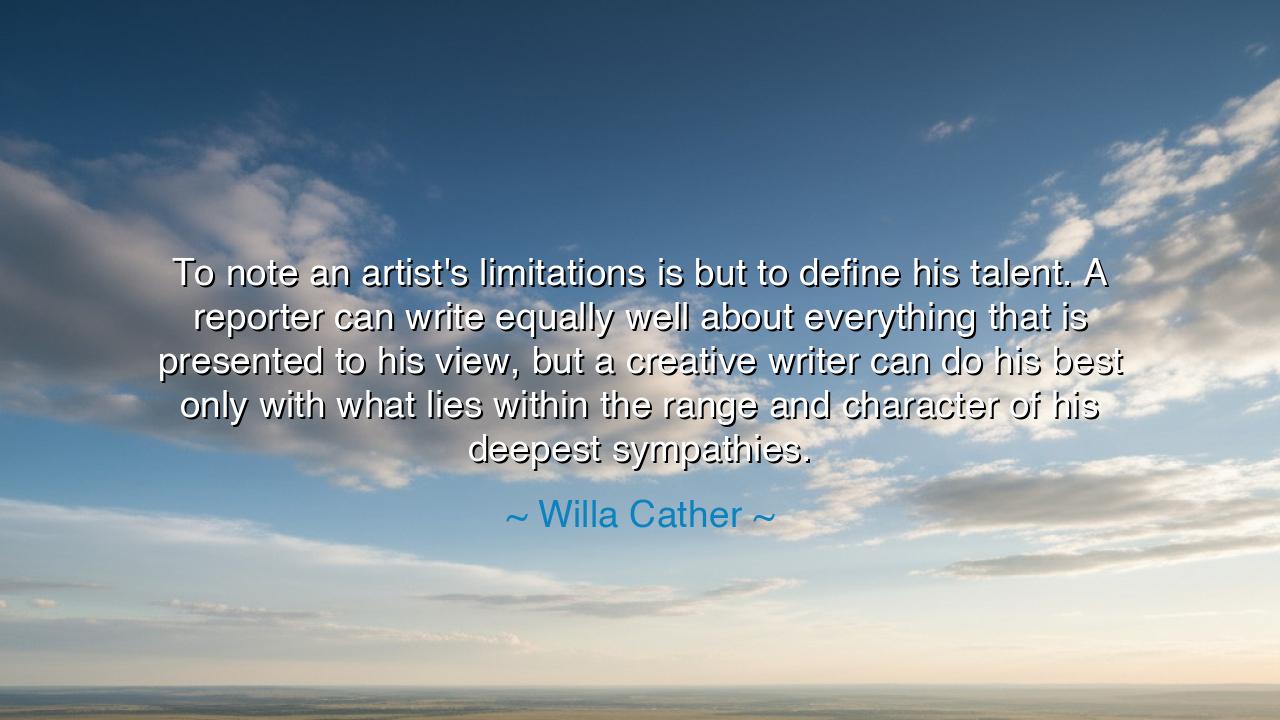
To note an artist's limitations is but to define his talent. A
To note an artist's limitations is but to define his talent. A reporter can write equally well about everything that is presented to his view, but a creative writer can do his best only with what lies within the range and character of his deepest sympathies.






Listen closely, children, for the words of those who understand the soul of an artist often carry wisdom that transcends the boundaries of time. Willa Cather, a writer whose deep connection to the human experience illuminated the pages of her novels, once said: "To note an artist's limitations is but to define his talent. A reporter can write equally well about everything that is presented to his view, but a creative writer can do his best only with what lies within the range and character of his deepest sympathies." In this profound reflection, Cather speaks to the unique power of the artist—the ability to shape meaning from within the depths of their own heart and soul. It is not the broadness of the artist’s scope that defines their greatness, but rather the depth of their engagement with the world around them.
In the ancient world, the great artists and philosophers were often defined not by their breadth of knowledge, but by their ability to see deeply. Socrates, for example, was not a man who sought to master every discipline or spread his wisdom across all subjects. Rather, he chose to focus on the pursuit of truth and virtue in the lives of individuals, and through this, he defined the boundaries of his philosophy. Socrates believed that true wisdom came from an understanding of one's limitations, and that this understanding was not a weakness but a strength—for it was within this narrow realm that one could touch the soul of human experience. In the same way, Cather reflects the ancient truth that the artist’s limitations are not to be seen as boundaries that imprison their creativity, but as the very frame within which the artist’s talent flourishes.
Consider the story of Homer, the ancient poet, whose Iliad and Odyssey shaped the foundation of Western thought. Homer did not seek to write about every aspect of human life; he focused instead on the heroic, the tragic, and the divine, drawing from the deep well of human emotion. His limitations as an artist—his choice to focus on the stories of gods and warriors—became his greatest strength, for through these tales, he captured the soul of humanity. Cather’s words echo this ancient wisdom: the artist does not need to cover all ground, for it is through their deepest sympathies, their emotional connection to the world, that they can create works of lasting significance. It is the artist’s ability to filter the world through their personal lens that gives their work its power and truth.
The creative writer—or any artist, for that matter—is not bound by the need to describe everything, but rather by the depth with which they can explore the themes closest to their heart. Cather understood that great works of art are not simply those that present the most information, but those that resonate deeply with emotion and understanding. Shakespeare, for example, was not concerned with presenting the entirety of human existence, but with delving deeply into the human condition—love, jealousy, betrayal, and ambition—emotions that, though specific, speak to all people, across time and space. Shakespeare’s genius lay not in the breadth of his subject matter, but in his ability to capture the depth of human experience, drawing from the well of his deepest sympathies.
In your own lives, children, take this lesson to heart: limitations are not something to fear, but rather something to embrace. The world often encourages us to stretch ourselves thin, to reach for more, to be everything to everyone. Yet true greatness comes not from spreading oneself too thin, but from the ability to focus deeply on what truly matters to you. Like Cather’s creative writer, you must find what resonates within your own heart—what brings you the most joy, meaning, or passion—and focus on it with all the depth you can muster. Whether you seek to be a great artist, thinker, or leader, know that it is your heartfelt dedication to a specific purpose that will elevate you, not the distraction of chasing many ambitions at once.
The ancients also taught us the power of focus and depth in their philosophies. Aristotle, though an expansive thinker, often spoke of the importance of focusing on what is essential. He believed that by understanding the core truths of life, one could unlock the full potential of human existence. Similarly, Cather’s reflection suggests that it is not the quantity of experiences or subjects that matters, but the quality of our engagement with them. To know your limitations—to recognize the boundaries of your talents and interests—does not diminish you. Rather, it allows you to hone your focus, to craft something meaningful from the depths of your heart.
So, children, the wisdom here is clear: do not fear your limitations. Instead, celebrate them, for they define where your true talent lies. Just as the great artists of the past found their greatness through focus, so too can you achieve your potential by embracing what speaks most deeply to you. Whether you are creating art, pursuing knowledge, or engaging in any other endeavor, remember that depth over breadth is what will set your work apart. Focus on what you love, explore it with your whole heart, and from that focus will emerge the greatness that lasts through time.






AAdministratorAdministrator
Welcome, honored guests. Please leave a comment, we will respond soon